2025 Acclaim Award Recipient

Henry Ford Health
Making It Easy to Receive High-Value Care
Henry Ford Health was recognized for the following initiatives:
-
Utilizing Press Ganey surveys in various programs across the continuum of care to measure patient experience, designating physician leaders to oversee and recommend new approaches to improve patient care
-
Capturing healthcare quality outcomes through a Primary Health Analytics engine to identify target populations with higher risk scores who can benefit from new programs
-
Tracking per-member per-year savings achieved, increasing shared savings by over 60% through cost reductions and quality improvements
-
Introducing new programs and process changes to reduce physician workload and burnout, such as optimizing clinic team roles, virtual care alternatives, physician support programs, etc.
Narrative: Enhanced Team-Based Care
Primary Health relied on the Care Model Design & Implementation Team, led by the CMO of Primary Care, to implement improvements across primary care. Clinical leaders then collaborate with partners in specialties, Population Health, Analytics, and Pharmacy to make changes. Ideas are identified from outcomes data, patient and provider surveys, and grassroots input from frontline providers and clinic teams. Pilots are followed by the evaluation and spread of the most promising innovations, resulting in a dynamic portfolio of projects in various stages: Design/Pilot, Spread, and Optimize and Sustain. If projects do not yield results after PDCA (Plan-Do-Check-Act) cycles, they are suspended, and the learnings are documented for future teams.
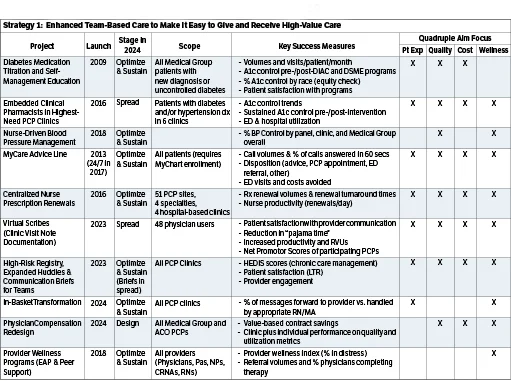
The following projects contributed to Enhanced Team-Based Care:
Guideline-Based, Top-of-License Care Team Design
The top-of-license improvements below have contributed to positive Hemoglobin A1c and Blood Pressure control trends across Primary Care.
Diabetes Medication Titration and Diabetes Self-Management Education
Nurses and certified diabetic coaches support primary care physicians (PCPs) and their patients who are diagnosed with diabetes. The goals are to optimize medication levels for hemoglobin A1c control while also helping patients help themselves as they learn how to manage important lifestyle changes. Success is measured by A1c control improvements, both initially and sustained at 6, 12, and 18 months after enrollment. These diabetes-specific staff support all primary care clinics with minimal supervision, following guidelines co-written by PCPs and endocrinologists. During in-person and virtual visits, nurses make necessary adjustments to medications based on assessments and recent hemoglobin A1c testing. The Self-Management Education program, adapted and optimized from national programs, engages newly diagnosed patients in a series of small-group interactive discussions guided by the coaches, which has proven more successful than traditional didactive approaches.
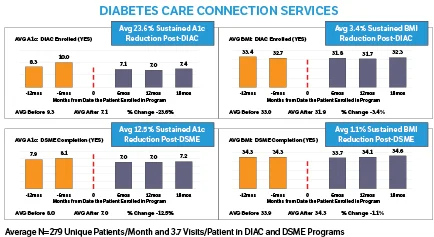

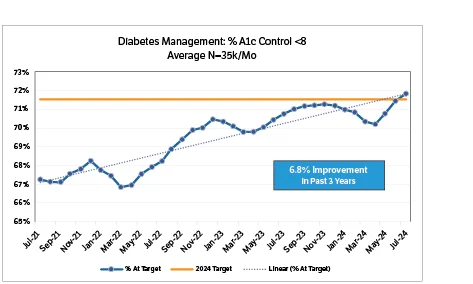
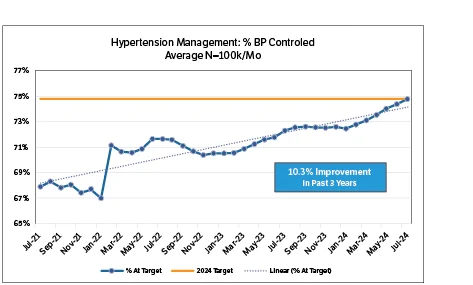
Embedded Clinical Pharmacists for Hemoglobin A1c Control
In 2016, a clinical pharmacist was embedded in 2 primary care clinics with high rates of uncontrolled diabetes. The goal was to test whether embedding a clinical pharmacist, armed with proactive analytics to target uncontrolled patients with an upcoming PCP appointment, could accelerate and sustain diabetes control (A1c< 8 mg/dL). The pharmacist engaged patients in person virtually or telephonically to titrate their medications, resolve barriers to medication adherence, and provide focused education. The results were promising: The rate of A1c control for 320 total patients touched by the pharmacist improved from 63.3% to 71.1% at one pilot clinic and from 66.3% to 73.6% at the second clinic. Pre-/postintervention statistics confirmed sustained A1c improvements as well as reductions in emergency center and hospital utilization. Based on these outcomes, the program was expanded to 6 clinics in 2018. In 2024, Henry Ford Health hired 11 more pharmacists (leveraging savings from insourced pharmacy scripts) to expand pharmacist involvement in additional “medication-sensitive” conditions, such as hyperlipidemia, COPD, and asthma.
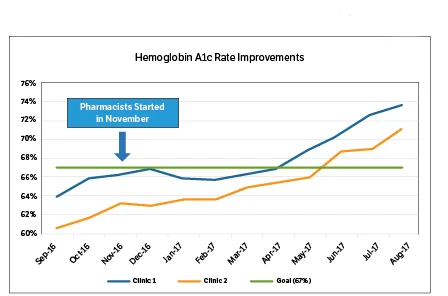
Nurse-Driven Blood Pressure Management
The following changes over the past 8 years have contributed to the 10.3% improvement in blood pressure (BP) control across all 51 PCP clinics, with measures incorporated into individual physician quality incentives: training and competency testing for accurate blood pressure measurement, a yellow card visual cue to re-check readings >140/90, free MA or RN blood pressure recheck appointments (which can include protocol-driven medication titration), installation of Automated Office Blood Pressure machines for improved accuracy, and collaboration with embedded pharmacists on BP equity projects.
MyCare Advice Line
This nurse-driven program, available 24/7, 365, was designed with the goal of providing fast and appropriate care advice for patients with health concerns. The toll-free line is marketed to patients on our website and on MyChart and is available to any patient aligned with primary care or OB/GYN. Nurses interview the patients using nationally validated triage protocols to understand current symptoms and advise appropriate next steps. This could include in-home treatment, a same-day or next-day PCP appointment at their closest clinic, an immediate warmtransfer to a dedicated provider for evaluation or On Demand Video Visit, or a referral to emergency or urgent care centers. The electronic medical record (EMR) is available for review, and triage is documented real time. On average, nurses manage nearly 6,000 calls per month, spend about 14 minutes per call, and average just over 1 minute in time-to-answer.
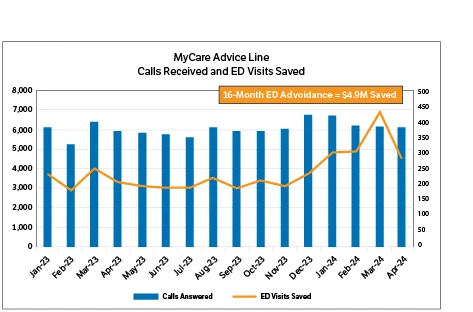
Centralized Nurse Prescription Renewal Department
In 2016, Henry Ford Health designed, tested, and centralized a prescription renewal function that had previously been dispersed. The goals were to reduce turnaround time, reduce clinic nurse and physician effort on renewals, and let clinic nurses focus on top-of-license patient needs. The nurses in the central department use standardized, physician-approved prescription renewal protocols based on specific patient history and medication class criteria programmed in the EMR. The department operates every day (including holidays), with longer hours on Mondays when request volumes are highest. After successful pilots at 2 large primary care sites, the department was fully launched by redeploying existing clinic nurses and now supports all primary care sites, plus 8 additional clinics added in 2018. After implementation, renewal volumes increased from 624,000 to over 900,000 per year, nurse productivity improved from 10 to 30 prescription renewals per hour, and turnaround time reduced from an average of 4-7 days to 99% of renewals completed in 1 day. The results have been sustained over the 8 years since full implementation.
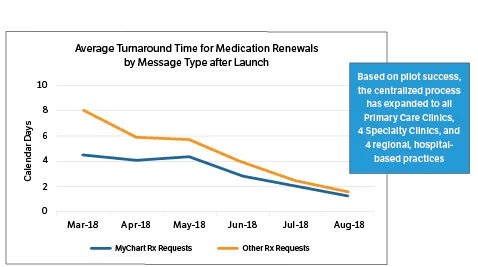
Virtual Scribes for Documenting PCP Visits
After an RFP process in 2023, Henry Ford Health piloted a virtual scribe program with the goals of improving physician satisfaction, efficiency, and patient experience. The PCP visit is recorded (with the patient’s consent), a scribe listens to the encounter, and drafts the visit note, which is ready no later than the next day for the physician’s review and approval. After the 30-day training and ramp-up period, the 48 participants saw an 8% growth in productivity (1.10 visits and 4.2 RVUs per FTE per day), and patient satisfaction with provider communication improved 2.05 and 1.69 percentage points on two questions. Provider wellness improvements included a 22% reduction in “pajama time” (time spent reviewing/ revising clinic visit notes at home and at night), and a Net Promoter Score of 70 across 33 surveys. Anecdotal feedback about the quality of notes, professionalism of virtual scribes, and impact on work/life balance has been overwhelmingly positive.
The biggest barrier to adoption is the up-front time needed to provide templates, example notes, and feedback to the scribes as they learn physician preferences, but within a month Henry Ford Health found physicians no longer need to revise the draft notes, meaning quicker approval and posting of the visit note. Based on positive experiences and return-on-investment through productivity enhancements, this program is being spread to interested PCPs as an alternative to self-documentation.
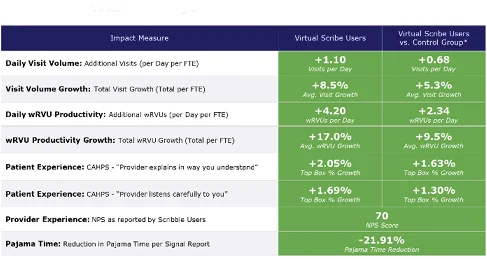
Proactive, Data-Driven Engagement of Enhanced Care Teams
With the goal of reducing provider workload and burnout, Henry Ford Health has piloted and spread several tools and process changes since 2023 to optimize panel management through expanded engagement of the care team.
- High-Risk Registry: To reduce reliance on Epic Slicer Dicer reporting, Primary Health clinical staff, Analytics, and the Epic team partnered to create a high-risk polychronic registry that is searchable and scalable, housed within the EMR, and actionable from the registry or from the patient’s record. This registry includes patients with 4 or more chronic conditions and ED/admission risk scores of 50% or more. Patient-level reports include chronic conditions, quality metrics, last and upcoming PCP visits, recent ED visits or admissions, polypharmacy, and social drivers of health. Data can be segmented by provider, clinic site, risk, or payer/contract for daily work and for designing/tracking improvements.
- Expanded Huddles: To improve care coordination and optimize top-of-license work, Henry Ford Health supplemented daily huddles (for previewing today’s patients) with weekly and monthly care team huddles, which were piloted first at 3 clinics and then spread to all clinics. Weekly huddles are used to review last week’s patients (addressing cancellations, no shows, care gaps, etc.) and plan for engaging patients as needed. Monthly huddles leverage the new polychronic registry (originally Epic Slicer Dicer reports) to review the physician’s high-risk panel with the entire team. They also piloted the review of 5-minute “Care Experience Communication Briefs,” adapted from best practices, during huddles. The impact of these micro-learnings, measured using Press-Ganey’s “Recommend This Provider Office” question, was a 1.08 percentage point improvement in top box scores (91.67 to 92.75) across ~5,500 surveys, which is substantial when top box scores are already above 90%. Based on the success of the pilot, existing and new “briefs” were spread to all primary care clinics and several specialty clinics in 2024.
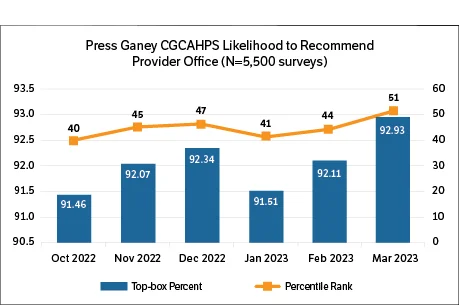
- In-Basket Transformation: With prescription renewals now managed centrally, the In-Box Transformation team addressed other patient messages (medical advice, medication questions, and appointment/test result follow-up) with the goal of less than 30% of messages requiring physician management. Changes included new EMR forms and prompts for more complete message capture and EMR filters in the Clinical Pool In-basket to auto-route messages to the most appropriate staff (MA vs. RN). The changes were piloted at three clinics with daily feedback to optimize the process, then spread to all Primary Care. In one month, messages forwarded to provider in-boxes dropped from 52% to 33%; by six months, the rate was 29%.
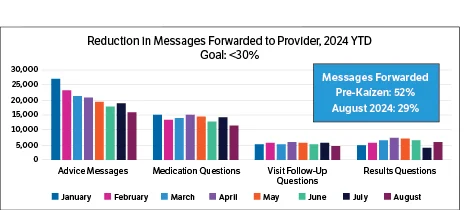
While Henry Ford Health experienced minimal barriers to implementing the process changes above, creating the high-risk registry was time-consuming and required new Epic team expertise. We also spent more time than anticipated reaching agreement on and coding our definition of “high risk.”
Looking to the Future
According to Jerry Finkel, MD, senior vice president, chief primary health officer, chief medical officer, value-based enterprise, Henry Ford Health, “Receiving the Acclaim Award is a great honor that speaks to Henry Ford Health’s dedication to providing remarkable, comprehensive, coordinated, and life-changing healthcare for all. Every day, our physicians are deeply focused on building meaningful relationships with; providing the highest quality care for; and improving the health and wellness of our patients. Our mission and core purpose is to make the impossible possible, and we are so privileged to have the opportunity to impact—and improve—the healthcare landscape in Michigan and beyond.”